
The Global Alliance Powerfuels published a report on public funding for powerfuels projects today, which systematically evaluates 116 support schemes from 31 countries and the European Union. It offers insights into the volume as well as the geographic, sectoral and technological scope of the programmes, and gives recommendations for the design and focus of future public financial support measures for hydrogen and other powerfuels.
Overall, the evaluated programmes have a total funding volume of about €200 billion; however, as their scope often covers other energy carriers or technologies, as well, only about 12% of their funding is dedicated to powerfuels specifically. The average amount of funding per project remains relatively low, and approximately 90% of the evaluated schemes provide CAPEX funding, which allows for technology development and enables demonstration projects to be set up. However, moving forward, OPEX funding will be more suitable to guarantee economic viability throughout the operation phase.
The analysis shows that while the number of programmes addressing the investment needs for large-scale powerfuels projects is already significant and growing, more than half of the evaluated programmes still focus mainly on providing funding for R&D or pilot projects. This is appropriate in the early stages of the market development, but the focus of public aid will need to shift towards facilitating implementation and operation of projects at an industrial scale (especially those with a capacity of 100 MW and larger), e.g. through longer-term offtake agreements with contracts for difference (CfD)-like funding designs.
Countries around the world have recognised the need to develop a global market for renewable hydrogen and the benefits of facilitating international trade of powerfuels, which becomes evident, e.g., in the growing number of strategic bilateral hydrogen partnership agreements. However, the evaluated project predominantly focus on domestic R&D activities and projects - to establish global supply chains, funding programmes will have to become more inclusive to foreign projects. In addition, the report also suggests to place more emphasis on integrating several value chain steps rather than supporting the build-up of production capacities alone, and to broaden the technological scope to incentivise the market development of different gaseous and liquid powerfuels beyond green hydrogen.
Members of the Global Alliance Powerfuels have access to the full database and results of the in-depth evaluation. If you would like to add to the database or to receive further information about this publication, please contact us at powerfuels(at)dena.de.
image credits: mapchart.net/world

